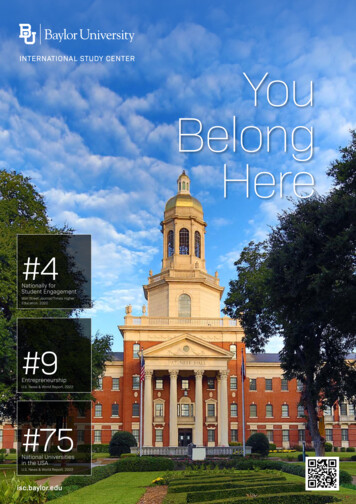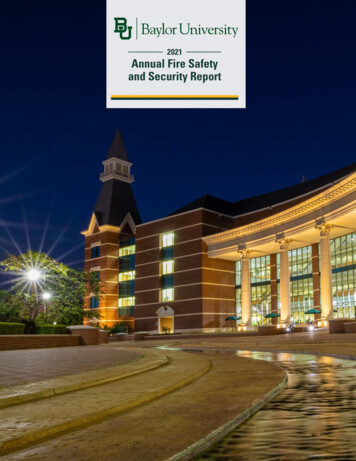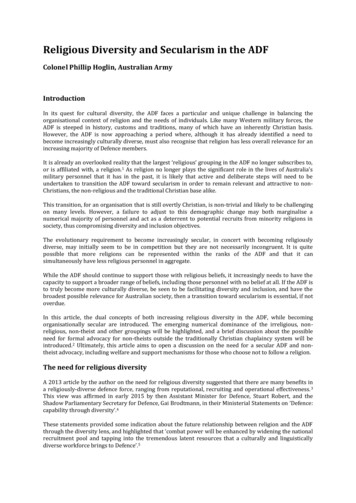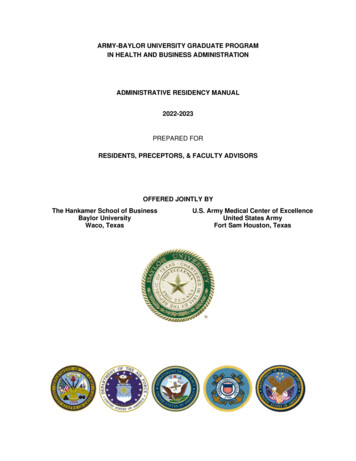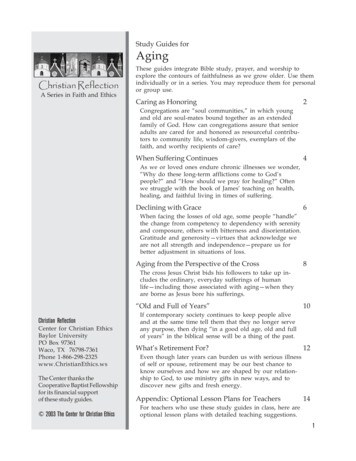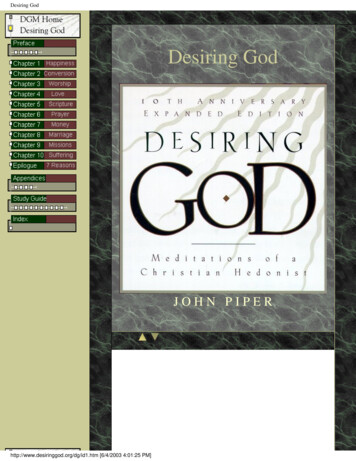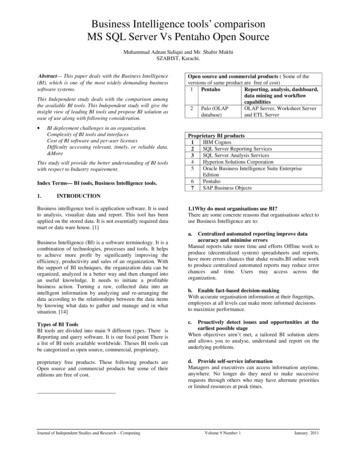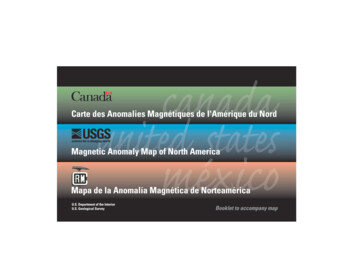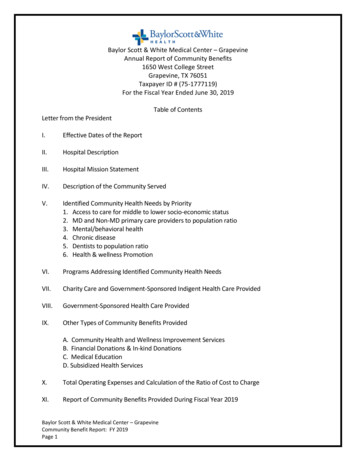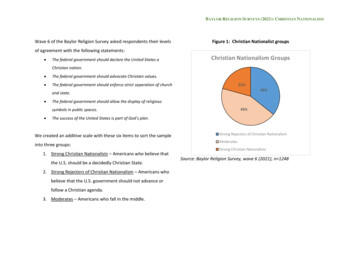
Transcription
BAYLOR RELIGION SURVEYS (2021): CHRISTIAN NATIONALISMWave 6 of the Baylor Religion Survey asked respondents their levelsFigure 1: Christian Nationalist groupsof agreement with the following statements: The federal government should declare the United States aChristian Nationalism GroupsChristian nation. The federal government should advocate Christian values. The federal government should enforce strict separation of church21%36%and state. The federal government should allow the display of religious43%symbols in public spaces. The success of the United States is part of God’s plan.We created an additive scale with these six items to sort the sampleinto three groups:Strong Rejectors of Christian NationalismModeratesStrong Christian Nationalists1. Strong Christian Nationalists – Americans who believe thatthe U.S. should be a decidedly Christian State.2. Strong Rejectors of Christian Nationalism – Americans whobelieve that the U.S. government should not advance orfollow a Christian agenda.3. Moderates – Americans who fall in the middle.Source: Baylor Religion Survey, wave 6 (2021), n 1248
BAYLOR RELIGION SURVEYS (2021): CHRISTIAN NATIONALISMOverall, levels of Christian Nationalism predict the 2020 ElectoralFigure 2: Christian Nationalists like Trumppreferences of Americans.Strong Christian Nationalists overwhelmingly (70%) supported Trump.2020 Election Preferences9083.2Still, nearly one quarter (24%) preferred Biden. A bare majority ofModerates (55%) preferred Biden to other candidates and nearly onethird (32%) chose Trump.8070.27060The strongest predictor of candidate preference was whether anAmerican strongly rejects Christian Nationalism. Only 6% ofRejectors preferred Trump to other candidates compared to 83% who55.4504031.83023.8supported Biden.20In sum, strong Rejectors of Christian Nationalism appear to haverejected Trump accordingly.106.30Strong Rejectors ofChristian NationalismModeratesTrump SupporterStrong ChristianNationalistBiden SupporterSource: Baylor Religion Survey, wave 6 (2021), n 1248
BAYLOR RELIGION SURVEYS (2021): CHRISTIAN NATIONALISMFigure 3: Christian Nationalism predicts social movement support and oppositionAntifaWhiteNationalismQanonSupport and Oppostion to Social 6.771.1Oppose2Support7.560.550.529.3102030Strong Christian pposeOppose81.540Moderates5060708090100Strong Rejectors of Christian NationalismSource: Baylor Religion Survey, wave 6 (2021), n 1248Overall, we found similar trends of polarization in between the three Christian Nationalist groups with regards to their support/opposition tocontemporary social movements. Although overall support for QAnon and White nationalism was very low in our sample, strong Christiannationalists could be found among their supporters more than the other groups. And unlike the other groups, the majority of the strongChristian nationalists oppose the Black Lives Matter (BLM) movement. Strong Rejectors of Christian Nationalism report the oppositepreferences, with a strong majority of them supporting BLM (86%) and opposing White nationalism (95%).
BAYLOR RELIGION SURVEYS (2021): CHRISTIAN NATIONALISMFigure 4: Christian Nationalism deeply tied to political opinionsPercent Agreement with Political Statements20.951.6The 2020 Election was stolen19.44.612.528.8Top Democrats run a pedophile ring10.55.354.831White Surpemacy is biggest terror threat45.879.842.823.2The Supreme Court is too conservative29.770.30Total Sample1020Strong Christian Nationalist30Moderates405060708090Strong Rejectors of Christian NationalismSource: Baylor Religion Survey, wave 6 (2021), n 1248Strong Rejectors of Christian Nationalism are most likely to agree that white supremacy is the biggest terrorist threat to the United States. Theyare also most likely to think the Supreme Court is too conservative. On the other hand, strong Christian Nationalists are more likely to acceptconspiracy theories, such as the “big lie” that the 2020 Election was “rigged” and the QAnon-inspired deceit that Democrats run pedophilenetworks.
BAYLOR RELIGION SURVEYS (2021): CHRISTIAN NATIONALISMFigure 5: Christian Nationalism affected how Americans understood the pandemicPercent Agreement with COVID Attitudes32.560.4COVID was exaggerated by the media35.512.210.618.7COVID vaccine should not be trusted11.54.957.927.6"China Virus" language promotes hate51.283.36128.9Trump failed in COVID response55.786.50Total Sample102030Strong Christian Nationalist40Moderates5060708090100Strong Rejectors of Christian NationalismSource: Baylor Religion Survey, wave 6 (2021), n 1248Strong Christian Nationalists are more likely to believe that the media exaggerated the pandemic and to distrust the COVID vaccine. They arealso much more likely to believe that the Trump administration responded appropriately to the pandemic and that calling COVID-19 the “ChinaVirus” is non-problematic. In contrast, strong Rejectors of Christian Nationalism overwhelming (87%) agreed that Trump botched the pandemicresponse and used hateful language (83%) to describe the virus.
BAYLOR RELIGION SURVEYS (2021): CHRISTIAN NATIONALISMFigure 6: Christian Nationalism is related to fear of religious othersPercent who feel this group threatens the unity of the United States32.661.9Muslims are a threat35.612.128.356.6Atheists are a threat32.96.511.625.6Buddhists are a threat12244.510Conservative Christians are a threat32.579.40Total Sample1020Strong Christian Nationalist3040Moderates5060708090Strong Rejectors of Christian NationalismSource: Baylor Religion Survey, wave 6 (2021), n 1248Strong Christian Nationalists are more likely to think Muslims, Atheists, and Buddhists are a threat to the unity of the United States. This showsthat they feel non-Christian citizens pose problems to their vision of a Christian nation. Most interestingly, strong Rejectors of ChristianNationalism overwhelmingly (79%) feel that conservative Christians are a threat to our country.
Source: Baylor Religion Survey, wave 6 (2021), n 1248 Strong Christian Nationalists are more likely to think Muslims, Atheists, and Buddhists are a threat to the unity of the United States. This shows that they feel non-Christian citizens pose problems to their vision of a Christian nation. Most interestingly, strong Rejectors of Christian

